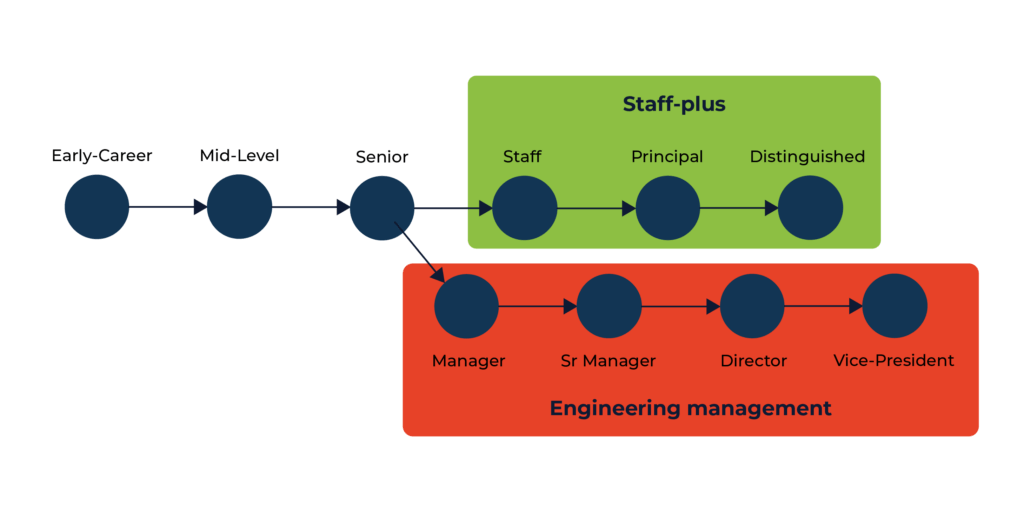Evolution of Technical Career After Senior Engineer
What is a staff engineer? Understand the next step on the technical career path post-senior engineer.
Join the DZone community and get the full member experience.
Join For FreeJust like engineering, the experience and impact of software creation are changing. The technical career also suffered this effect and has been changing over time. That's what we're going to talk about in this article: Staff-Plus Engineer.
Indeed, this change will continue; software engineering is constantly evolving, so the positions also need to develop.
It is always important to point out that the technical career varies according to country, companies, and time. In general, we can think of the technical career movement in three significant trends:
From Engineering Professional to Manager
A widespread move at the beginning of the area was to define that the management career was a mandatory move for everyone! That is, an engineer, after the senior position, to impact the organization more, would have to migrate to functions such as manager, head, and director, among others.
From Career Separation: The Birth of Career in Y
Over time, companies understood that innovating was necessary to remain competitive. That's when they realized that certain people stood out in an area, always delving deeper, seeking knowledge, and offering solutions to the main demands.
However, most of the time, he did not occupy a position equal to his work, as the traditional career usually values only leadership positions.
The advantage of this movement is the possibility of allowing the individual to remain in the technical area instead of abruptly switching to management. Thus, with career Y, the specialist position is born, where it is possible to focus on a specialization.
Most relevant to be evaluated are the time of professional experience, the lower speed to solve problems, and the risk that would be generated with the loss of that person.
From Experts Without Strategic Participation
However, on the one hand, the management position is responsible for all the strategic and technical weight; on the other, the specialist person, fatally, becomes just an expensive or luxury senior.
The short term is good since the person does not need to go to management and prefers to delve into their respective specialization; in the long term, the challenge is to justify their existence.
We can also say that this fueled a belief, a paradigm, that people who choose not to continue in management are those who do not like to deal with and live with each other. And this taboo makes us exercise and encourage the development of so many soft skills in professionals who have followed, without criticism, this “natural” movement.
Meanwhile, some people and companies began to notice a new wave happening, both because of the need for the career of specialist people, who wanted to know and impact more, and for companies that had an imminent need for their business to be also influenced by a complementary vision of technicality.

Today, there are many discussions about whether it makes sense to use the term career in Y. Mainly because both are crucial areas. Still, it would compare bananas with apples with different knowledge and specializations. It is one of the reasons it often doesn't correlate with a Y career or a 2.0 version of it.
Going deeper into these profiles and their differences, we can use the framework for a professional engineering career and compare the two shapes: management and technical leadership or staff-plus.

For example, we could visualize the last stage of the management and staff careers using the engineering ladders framework. Overall, they manage to fill the entire strategic quadrant of an organization together.
The great challenge is, in addition to realizing this complementarity and highlighting corporate careers, it is necessary to open spaces for exchange in practice and involve both audiences in small and large meetings of discussion and decision.
What Is the Most Significant Difference Between a Senior and a Staff-Plus Engineer?
A recurrent thought of the technical career is that it is unnecessary to learn new skills or deal with people when evolving into a staff.
It's a thought that many organizations believe is a mistake of the past. Software is made for people and by people. Thus, the human factor becomes critical.
The Staff will continue without the responsibility of managing a team; that is, they will not deal with raises, salaries, team coordination, etc. However, he is responsible for offering career mentorships to engineering colleagues, multiplying software quality, and thinking about the impacts of architecture, mainly strategically.
Based on this, technical leadership will have to evolve technically, but not only that, it will require better communication skills and more significant concern for their teams. This process makes this career play a critical role in influencing through argumentation, persuasion, and negotiation.
What Do I Need To Know To Understand Better?
The term is extensive, and the first step to learning more about this career is Will Larson's book: Staff Engineer: Leadership beyond the management.
You can find cases from large companies such as Netflix, Microsoft, Elastic, Github, 1Password, Gitlab, etc... The author worked on them to know their behaviour. There is no clear and explicit standard between companies, but there are some similarities, and this book addresses that a lot.
Within the staff are the levels of technical evolution and what is expected at each level.
Knowing the Staff-Plus Engineer Levels
Generally speaking, we have the following levels as individual contributors:
Staff Engineer
An engineer who will help the team, in addition to the code, with mentoring, design, and architecture decisions.
Principal Engineer
- Professional who will start working at an organizational edge and with a strong tendency to run cross-team;
- Its objective is to impact a board or a product through studies and strategic decisions;
- Has an alignment with the board;
- They usually have a qualification that impacts the company and has an organizational influence.
Distinguished Engineer
- Professional of excellence whose main objective is to impact the entire organization;
- Their alignment is usually with the VPS (Vice Presidents) of the company;
- This position also serves as recognition for technical and scientific excellence in the IT field;
- Overall, someone has already impacted/impacted everyone by creating some pattern, language, framework, etc.
Some illustrious references of people in this position are, for example:
- James Goslin, father of Java;
- Guido van Rossum, father of Python;
- Emmanuel Bernard, co-creator of Quarkus.
With this position, there is always the question of programming frequency. Yes, the engineering person needs to be close to code and with trends; however, the coding time will decrease as the career evolves.
Conclusion
The technical career of an engineer has been changing over time, especially when technology has become a strategic resource for organizations.
Professionals with excellent technical knowledge that can apply it efficiently, impacting the entire organization, are increasingly needed; therefore, communication skills are also essential.
It is how Staff-Plus Engineer was born, focusing on people capable of achieving a good balance of soft and hard skills. This first article talks a little about the motivation and needs of professionals in this position. In the second part, we will focus on the most frequently asked questions on the subject.
Opinions expressed by DZone contributors are their own.

Comments